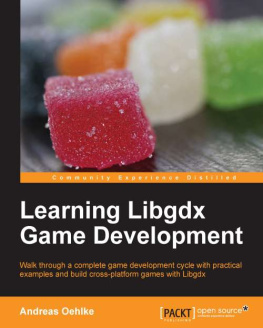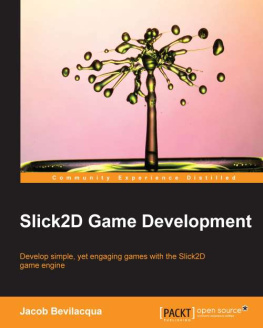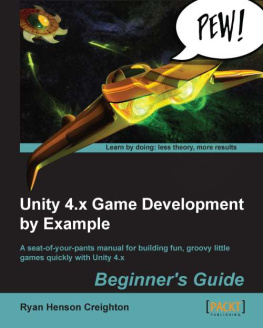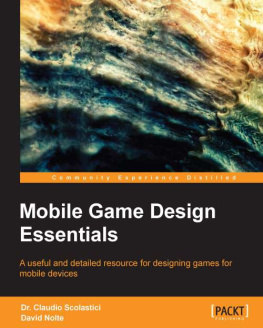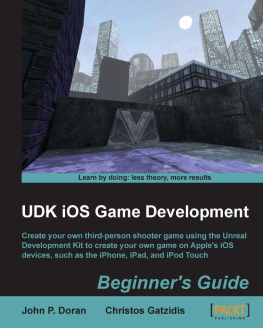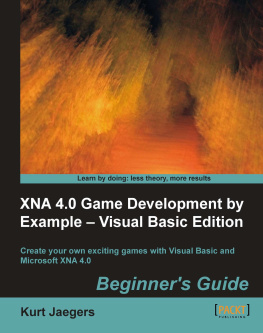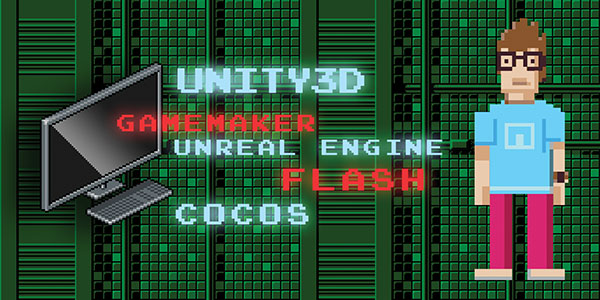The Indie Game Developer Handbook
The Indie Game Developer Handbook
Richard Hill-Whittall

First published 2015
by Focal Press
70 Blanchard Road, Suite 402, Burlington, MA 01803
and by Focal Press
2 Park Square, Milton Park, Abingdon, Oxon OX14 4RN
Focal Press is an imprint of the Taylor & Francis Group, an informa business
2015 Taylor & Francis
The right of Richard Hill-Whittall to be identified as the author of this work has been asserted by him in accordance with sections 77 and 78 of the Copyright, Designs and Patents Act 1988.
All rights reserved. No part of this book may be reprinted or reproduced or utilised in any form or by any electronic, mechanical, or other means, now known or hereafter invented, including photocopying and recording, or in any information storage or retrieval system, without permission in writing from the publishers.
Notices
Knowledge and best practice in this field are constantly changing. As new research and experience broaden our understanding, changes in research methods, professional practices, or medical treatment may become necessary.
Practitioners and researchers must always rely on their own experience and knowledge in evaluating and using any information, methods, compounds, or experiments described herein. In using such information or methods they should be mindful of their own safety and the safety of others, including parties for whom they have a professional responsibility.
Product or corporate names may be trademarks or registered trademarks, and are used only for identification and explanation without intent to infringe.
Library of Congress Cataloging-in-Publication Data
Hill-Whittall, Richard.
The indie game developer handbook / Richard Hill-Whittall.
pages cm
Includes bibliographical references.
1.Computer gamesProgramming.I.Title.
QA76.76.C672H55 2015
794.8'1526dc23
2014033755
ISBN: 978-1-138-82842-1 (pbk)
ISBN: 978-1-315-73841-3 (ebk)
Typeset in Minion Pro
By Apex CoVantage, LLC
Contents
Indie game development is a wonderful, exciting and incredibly rewarding job. It offers a world of possibilities and promise, and with careful planning and perhaps a little luck, you can earn decent regular revenue and begin building up a successful studio.
It has never been easier to develop a game, thanks to the wide range of development SDKs such as Unity 3D, Game Maker and Unreal that are now available. The opportunities to self-publish your own games are many and variedyou can create the game you want to create and know that you can get it to market on a large array of different devices, including PCs, consoles and mobiles.
Be prepared to persevere; often your first game will only bring you limited returns, yet your first published title acts as a vital initial step in building up a catalogue of titles, expanding your community of followers and ultimately earning a solid regular income.
I started out developing video games in 1995, at a company called Silltunna Software. My first game was called XTreme Racing for the Commodore Amiga, and my primary role was artist and track designer. I also dipped my toe in the water in other areas, such as PR, business development and marketing. I knew from that point on that this was what I wanted to do more than anything else in the world.
Since I was about 10 years old, video games have been my passion. I would spend hours playing games on my first computer, a ZX Spectrum, dreaming about one day creating my own games. Here I am, nearly 30 years later, doing just thatand I have been for the last 18-ish years.
During that time, I have managed the development of, and released, 33 games over 44 different SKUs. In addition to running the development of those games, I was also the lead artist, game designer and sound designer. It has been an incredible, wonderful and terrifying experience, and I consider myself incredibly lucky to be able to do what I do for a job.
I have self-published 14 of those games, which looking back now seems unbelievable. True, some titles make little money, but the personal reward and enjoyment from creating each game, getting that final product out there is just incredible.
What greater incentive can there be than to know that if you keep creating games, keep doing the job you love, that one day you may earn enough money to change your life forever? Sure, its a longshotbut that glimmer is always there.
I have made a whole bunch of mistakes and learned a lot of lessons the hard way. I have released some games I am really pleased with, and others that I am not. Through it all I have always loved the day-to-day development process; creating new games, learning new techniques, sourcing new content. To me this is the best job in the world!
What I have tried to do with this book is to document every single aspect of indie game development. I have included expert advice from other studios and industry professionals, along with my own personal experiences of running an indie game development studio over the last 18 years. My hope is that this book will provide a useful knowledge base and help to support the learning process of running an indie development studio, allowing you to focus on creating amazing, fun and well-received games.
Id like to say a big thank you to the following sites and individuals, all of whom provide amazing insight and resources for indie developers:
Pixel Prospector (http://www.pixelprospector.com)
What can I say? THE best site on the internet if you are an indie game developer.
Gamasutra (http://www.gamasutra.com)
An incredibly useful treasure trove of information, advice and firsthand development experiences.
Game Academy (https://www.gameacademy.com)
Excellent selection of game development, PR and marketing help and advice articles.
Cliff Harris/Positech (http://positech.co.uk/cliffsblog)
A no-nonsense guy with a lot of great advice for indies.
Develop (http://www.develop-online.net)
Another great resource for indie development info.
Tigsource (http://forums.tigsource.com)
A fantastic discussion forum with a very active and helpful indie community.
Harry van Horen at Rangeela (http://www.rangeela.nl)
For always being 100% reliable and a very nice guy.
Jay Koottarappallil at WhiteMoon Dreams
A big thanks to Jay for his help and insight.
Harry Holmwood
An insightful and thoroughly good guy.
Agostino Simonetta
For being the best guy in the industry, who had helped me out a lot.
Alex Chapman
A decent guy and very good game lawyer, who had helped many indie studios over the years.
Danny Flexner
Great artist with a good eye for marketing.
Fancy a chat? Drop me an email to
On that note, lets begin
When I first started creating games there was really only one choice for development, and that was to create your own engine. As such, when I began creating games, my studio developed and maintained our own cross-platform engine. Initially this engine was created for PlayStation 2 and PC development, and later expanded to cover PSP, PSVita and Wii. While having our own engine did present us with opportunities to get games published, it was also a complete and utter nightmare to maintain. Months and months were spent creating, optimizing, fixing and tweaking the engine for each new platform, and during those times we would be financially wiped out due to the time and resources it took to get the engine to support those new platforms and features.

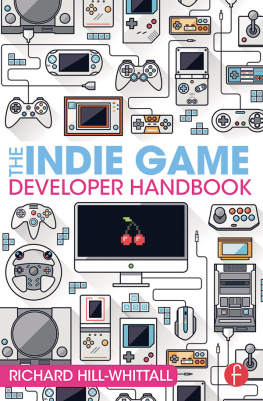
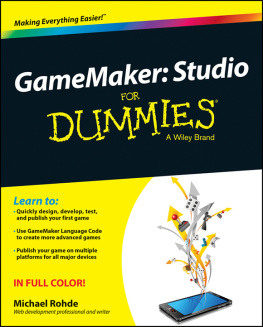
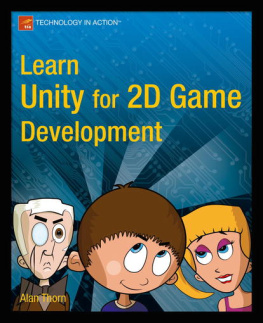
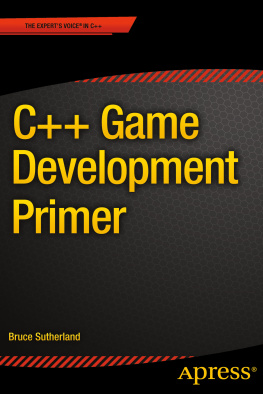
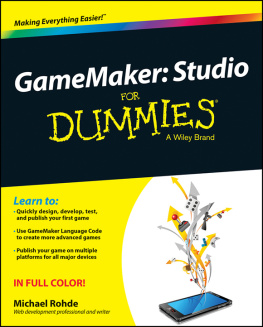
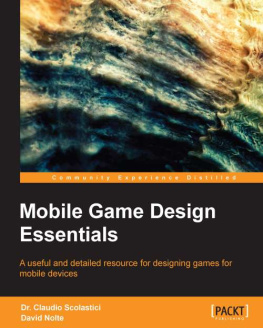
![J. F. DiMarzio [J. F. DiMarzio] - Android Studio Game Development: Concepts and Design](/uploads/posts/book/119418/thumbs/j-f-dimarzio-j-f-dimarzio-android-studio.jpg)
